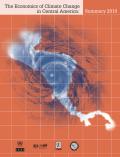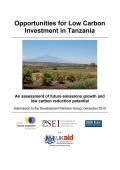
This literature review assesses the extent to which developing countries can make the transition towards low or lower patterns of growth. It explores the potential impacts of climate change on economic growth and the investment needs for increasing growth resilience. The paper outlines the challenge of establishing patterns of low carbon growth and discusses the cost of greenhouse gas mitigation. The feasibility of low carbon growth in developing countries is explored, including a review of the evidence, the economic impacts, its limitations and possible next-steps. The literature suggests that significant mitigation levels can be achieved without having a major impact on growth objectives. The paper presents the various aspects of climate resilient growth patterns and how to realise them respectively. Topics covered include a review of the evidence and methods, understanding the political context and the matter of technological deployment.

This report is very much focused on private sector led initiatives to responding to climate change. The report is based upon the results of a survey of business leaders committed to advancing climate action, especially in ways that build the resilience of vulnerable communities in developing countries. It offers help to companies with national, regional or global reach to develop strategies for dealing with the immediate to long‐term consequences of climate change in developing countries where they have operations, supply chains, employees, or customers.
This report evaluates the requirements for an assessment of climate change impacts on agriculture to guide policy makers on investment priorities and phasing. Because agriculture is vital for national food security and is a strong contributor to Brazil's GDP growth, there is growing concern that Brazilian agriculture is increasingly vulnerable to climate variability and change. To meet national development, food security, climate adaptation and mitigation, and trade goals over the next several decades, Brazil will need to significantly increase per area productivity of food and pasture systems while simultaneously reducing deforestation, rehabilitating millions of hectares of degraded land, and adapting to climate change. There is inadequate data to accurately model projected climate challenges facing Brazil. The report concludes that key integrated and linked interventions are needed in the short term to significantly improve currently available assessments of climate change impact on Brazilian agriculture and to guide policy makers with the priorities and phasing of needed investments.
